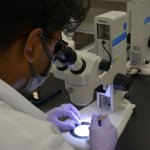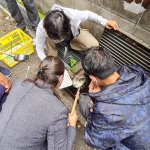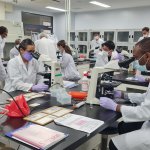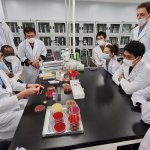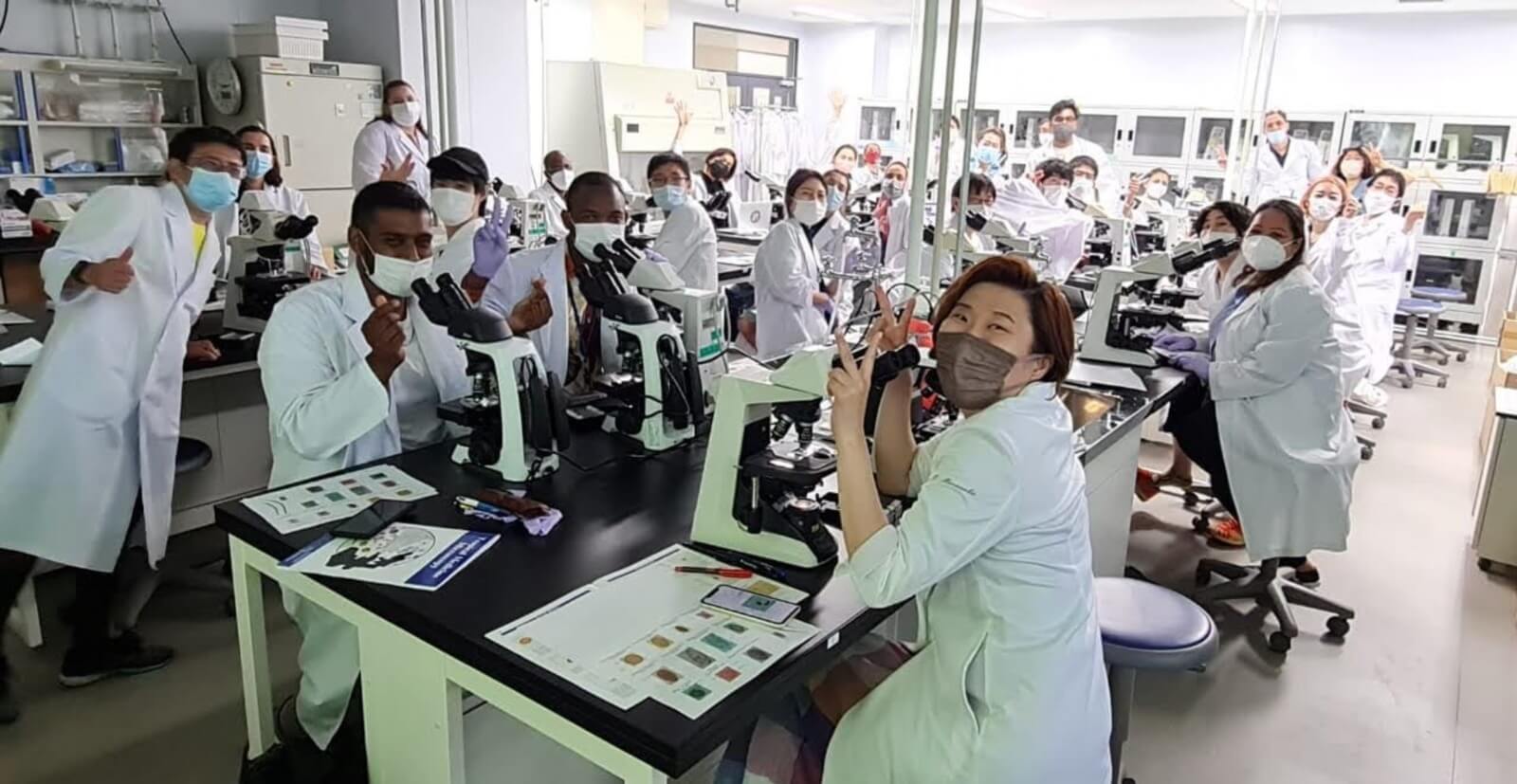*** Application form ***
(application is open to October: early application is encouraged)
*** Register interest ***
(Open all year)
Course overview
The Nagasaki Diploma of Tropical Medicine and Hygiene (DTM&H) is an 11 week, full time taught course in Japan. The course was established in 2019 and is taught by lecturers from Japan, the UK, the Philippines and many other countries. We welcome applications from doctors who are planning to work with international health missions, work in travel clinics, or from those with a general interest in the field. The course is approved by the American Society of Tropical Medicine and Hygiene (ASTMH) and The Worshipful Society of Apothecaries, which means students can apply to sit the CTropMed exam or the UK (Independent) Diploma of Tropical Medicine & Hygiene (DTM&H) examinations.


Aims & objectives
The aim of this course is to equip medical doctors with the knowledge and skills to practice medicine and promote public health in resource limited regions. It also aims to spark research interest in global health and encourage students to go for higher degrees such as Masters and PhDs in related fields.
Content
The course covers important infectious diseases that are prevalent in resource limited regions including tuberculosis, malaria, and HIV, as well as neglected tropical and non-communicable diseases. The course contains academic modules linked with the Master of Tropical Medicine (MTM). Please note that some of these sessions have a more basic science/research focus. Clinical case discussions are held with colleagues in hospitals in the Philippines, Vietnam and Nepal. Laboratory practicals include microscopy techniques, parasitology, bacteriology, and medical zoology. Total learning time is approximately 300 hours including, lectures, group discussion, self-study and laboratory work.
Eligibility
We encourage applications from Japan and all over the world.
- 【Pre-requisites】
- Medical doctors with 2 or more years of work experience.
- 【English language requirements】
- As the course is taught fully in English, students should have good English language ability, but it does not have to be perfect. The course provides a good opportunity to improve your medical English.
Location/accommodation
DTM&H course is run in Nagasaki which is a historic city and the capital city of Nagasaki Prefecture located in Kyushu island in Japan. Students need to manage accommodation by themselves. For international students, further information on accommodation options can be provided and we will support wherever possible.
Course dates
| Year of 2026 | From April 1 to June 12 |
|---|---|
| Year of 2027 | From April 1 to June 11 |
- Tentative schedule for 2026
- Week 1: HIV, malaria, various topics
- Week 2: TB, various topics
- Week 3: Leishmaniasis, humanitarian emergencies, various topics
- Week 4: Various topics
- Week 5: Maternal & child health, non-communicable diseases
- Week 6: (May 4-8): Reading week (no sessions)
- Week 7: Lab practicals, lectures, various topics
- Week 8: Lab practicals, lectures, various topics
- Week 9: Lab practicals, lectures, clinical cases
- Week 10: Clinical cases, revision
- Week 11: Revision, exams, closing
- An ‘Introduction to Tropical Medicine’ module will be made available online learning system to review, one month in advance of the course.
Tuition fees
| Applicants from High Income Countries | 650,000 JPY |
|---|---|
| Applicants from High Income Countries who completed the Certificate of Tropical Medicine (CTM) course in previous years | 550,000 JPY |
| Applicants from Japan or Low-to-Middle Income Countries | 450,000 JPY |
| Applicants from Japan or Low-to-Middle Income Countries who completed or are expected to complete the Certificate of Tropical Medicine (CTM) course | 350,000 JPY |
*The tuition fees listed above are subject to change.
- Classification of income levels follows World Bank database. Applicants need to check the latest database when applying.
- When applying for the fees for Japan or LMICs, applicants are to submit proof of status (passport and proof of current residence).
- Overseas students should ask their own government education department or organisation for details of scholarships and grants available.
- It should be noted that most of the candidates attending this course will be self-funded.
Payment deadline of the tuition fee
The tuition fee should be paid in full as indicated in the acceptance letter for admission. (typically within 1 month of notification of offer)
How to apply
- 【Apply to the course】
- The application form opens in September and the first group of offers will be made in early November.
- Early application is advised. The application period may be closed early if a large number of high quality applications are received.
- 【Register interest】
- Register interest in future Nagasaki University tropical medicine courses here
*Be careful: registering interest will never be automatically switched to application
- Register interest in future Nagasaki University tropical medicine courses here
Visas
Students are responsible for obtaining any visa or other permissions to attend the course and are encouraged to start the application process as early as possible. The course administration can provide supporting documentation if requested.
Linked courses
Master of Tropical Medicine (MTM)
A one-year master course that starts in October each year and includes the DTM&H.
Philippines Tropical Medicine Course (PTMC)
A 2-week practical clinical and public health tropical medicine course in San Lazaro Hospital, Manila (1 week) and Leyte (1 week) comprising bedside teaching, lectures/discussion and fieldwork in the communities. Intake quota is limited to 24 students and priority will be given to current DTM&H students and DTM&H graduates.
Certificate in Tropical Medicine (CTM)
A 6-month part-time online course to teach doctors key concepts of diseases that are especially prevalent in tropical and resource limited regions. Students can access lecture recordings and other materials in their own time through the online learning system according to their preference. The course includes most of the didactic sessions from the DTM&H course but does not include laboratory practicals or interactive clinical case discussions. Assessment is with an online multiple choice exam.
Key differences of the tropical medicine-related short courses
| Diploma in Tropical Medicine and Hygiene (DTM&H) | Certificate in Tropical Medicine (CTM) | Philippines Tropical Medicine Course | |
|---|---|---|---|
| Location | Nagasaki | Online | Philippines |
| Intensity | Full time | Part time | Full time |
| Duration | 11 weeks | 6 months | 2 weeks |
| Certificate conferred | Professional Diploma | Certificate | Certificate |
Contact
| Issues specific to this course Direct contact to the course management team |
dtmh.nagasaki@gmail.com |
| Issues general to TMGH courses Contact to TMGH administrative office |
https://www.tmgh.nagasaki-u.ac.jp/en/contact_us |
Photos from previous courses
Student testimonials
“Finally, I got a Diploma in Tropical Medicine & Hygiene (DTM&H) in Nagasaki! DTM&H started from 1899 in London School of Hygiene & Tropical Medicine (LSHTM), then this was a first-trial DTM&H in Nagasaki. There were great lectures from LSHTM professors and wonderful lab practices. They have become precious experiences to me. THANK YOU!”
“There are three good things about this course: first, my English has improved dramatically; second, my knowledge of infectious diseases has deepened; and third, I have made friends from all over the world with different backgrounds” “Many of the lecturers were at the top of their fields and had a sense of mission, and they spoke to us with a passion far beyond their own”
“It was diverse and very informative. Hybrid teaching, video recordings, supportive organizers make this course unique. Lab practicals were great”
“The course went very good, even better than I expected. Study materials, handouts and recorded videos all are very good”

